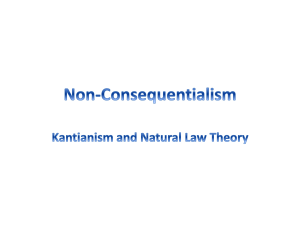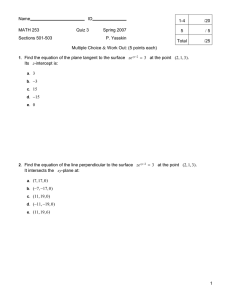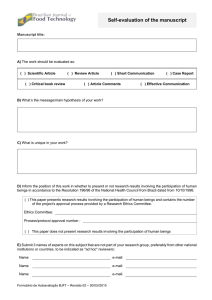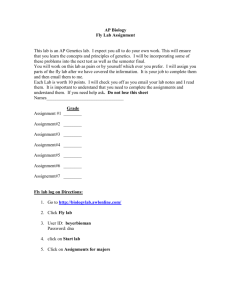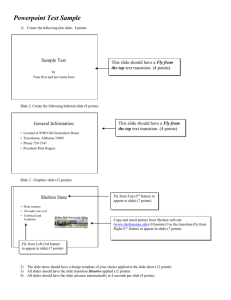Continuing Conversations Panel
advertisement
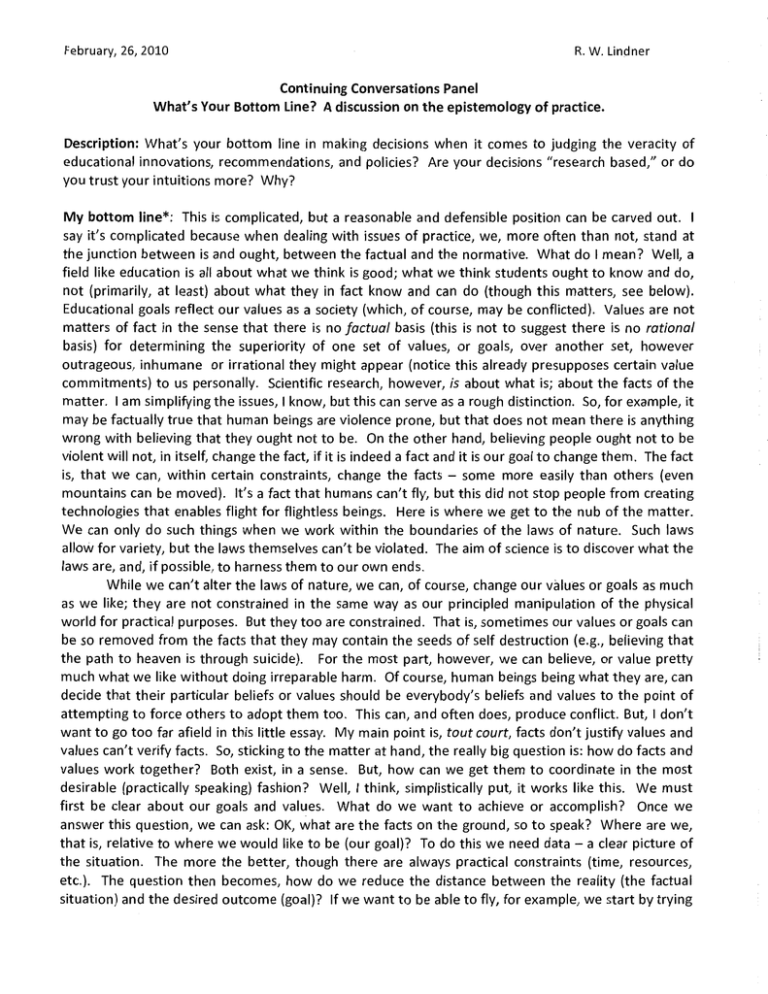
February, 26, 2010 R. W. Lindner Continuing Conversations Panel What's Your Bottom Line? A discussion on the epistemology of practice. Description: What's your bottom line in making decisions when it comes to judging the veracity of educational innovations, recommendations, and policies? Are your decisions "research based," or do you trust your intuitions more? Why? My bottom line*: This is complicated, but a reasonable and defensible position can be carved out. say it's complicated because when dealing with issues of practice, we, more often than not, stand at the junction between is and ought, between the factual and the normative. What do I mean? Well, a field like education is all about what we think is good; what we think students ought to know and do, not (primarily, at least) about what they in fact know and can do (though this matters, see below). Educational goals reflect our values as a society (which, of course, may be conflicted). Values are not matters of fact in the sense that there is no factual basis (this is not to suggest there is no rational basis) for determining the superiority of one set of values, or goals, over another set, however outrageous, inhumane or irrational they might appear (notice this already presupposes certain value commitments) to us personally. Scientific research, however, is about what is; about the facts of the matter. I am simplifying the issues, I know, but this can serve as a rough distinction. So, for example, it may be factually true that human beings are violence prone, but that does not mean there is anything wrong with believing that they ought not to be. On the other hand, believing people ought not to be violent will not, in itself, change the fact, if it is indeed a fact and it is our goal to change them. The fact is, that we can, within certain constraints, change the facts - some more easily than others (even mountains can be moved). It's a fact that humans can't fly, but this did not stop people from creating technologies that enables flight for flightless beings. Here is where we get to the nub of the matter. We can only do such things when we work within the boundaries of the laws of nature. Such laws allow for variety, but the laws themselves can't be violated. The aim of science is to discover what the laws are, and, if possible, to harness them to our own ends. While we can't alter the laws of nature, we can, of course, change our values or goals as much as we like; they are not constrained in the same way as our principled manipulation of the physical world for practical purposes. But they too are constrained. That is, sometimes our values or goals can be so removed from the facts that they may contain the seeds of self destruction (e.g., believing that the path to heaven is through suicide). For the most part, however, we can believe, or value pretty much what we like without doing irreparable harm. Of course, human beings being what they are, can decide that their particular beliefs or values should be everybody's beliefs and values to the point of attempting to force others to adopt them too. This can, and often does, produce conflict. But, I don't want to go too far afield in this little essay. My main point is, tout court, facts don't justify values and values can't verify facts. So, sticking to the matter at hand, the really big question is: how do facts and values work together? Both exist, in a sense. But, how can we get them to coordinate in the most desirable (practically speaking) fashion? Well, I think, simplistically put, it works like this. We must first be clear about our goals and values. What do we want to achieve or accomplish? Once we answer this question, we can ask: OK, what are the facts on the ground, so to speak? Where are we, that is, relative to where we would like to be (our goal)? To do this we need data - a clear picture of the situation. The more the better, though there are always practical constraints (time, resources, etc.). The question then becomes, how do we reduce the distance between the reality (the factual situation) and the desired outcome (goal)? If we want to be able to fly, for example, we start by trying February, 26, 2010 R. W. Lindner to understand flight- how does it work? What allows birds to fly? We may spend a great deal of time isolating the key variables, but if we are successful, we will understand flight on a principled basis (and arrive at a science of aerodynamics). That alone, of course, won't allow us to immediately fly. The next question is, how do we use our knowledge of flight to develop, or design, a solution for getting us to our goal? Again we are reduced to trying out various hypothesis, combinations of materials or components, etc. until we hit upon a path that leads to a solution. I realize that I have here "prettified" what is actually a rather messy path to discovery and invention. However, this is what we have learned to do with the advent of the modern approach to knowledge construction we call science. First we discover the laws, or principles that govern some phenomenon (theoretical science). Then we see if we can apply that knowledge for our own ends (applied science and resulting technologies). It's a pretty effective strategy even if it's not always pretty. I've come to the end of my little tale. How do I approach educational innovations, applications, recommendations, etc.? What's my "bottom line"? Well, I ask myself a series of questions? 1. What's the goal? What end-state do we have in mind? If we have a choice and can afford to take the time, of course, we can also ask: Is this a sensible and desirable goal (more often than not, we get stuck here. This usually means we should rethink the issue)? If the goal seems sensible and desirable, I then ask: 2. What do we know about the current state of the situation? Do we have data, or are we just assuming something is the case anecdotally? How reliable (relatively free from error, NOT just consistent) are the facts we have? Do the fact we claim to have actually pertain to the problem at hand (validity question)? 3. If the facts are pretty clear regarding where we are, do we have any principled understanding of how this "stuff" (e.g., learning, motivation, etc.) works? Are there good scientific theories we can apply? If not, lets put our effort into developing them. If a good theory exists, let's deduce, or develop, some reasonable models based on our theory and test things out under conditions that increasingly approximate the conditions under which we are seeking to apply them. Once we develop realistic and reliable applications, let's put them to work toward our goal. Why: First off, let me admit that I have described something fairly ideal. Sometimes we have to move on the basis of the best evidence available, which may not be very good evidence. If possible (if I can afford it), in such situations, I will often prefer to do nothing until I can get better evidence. This is a risk, but there are risks either way, so if my life doesn't depend on it, I'd rather not act than do something half-baked. I think the strategy I described above took a long time (and many individuals building on one another's efforts) for human beings to develop. It has not been without it's costs (there are no cost free solutions!), but, on the whole, it has brought us many successes (over disease, hunger, threat from predation, etc. etc.). It has, in my view at least, brought us overall greater benefit than harm (misuses of the method can't be blamed on the method). Hence, I think it is currently the most defensible approach to problem solving and goal achievement available to us. This, in sum (proceeding according to steps 1,2 & 3 above, that is), is what "scientifically grounded" practice means to me. Of course, I am open to better options when and if anyone can provide them? *My apologies for the denseness of the prose above, but I have tried to keep the discussion to a length of two pages.
